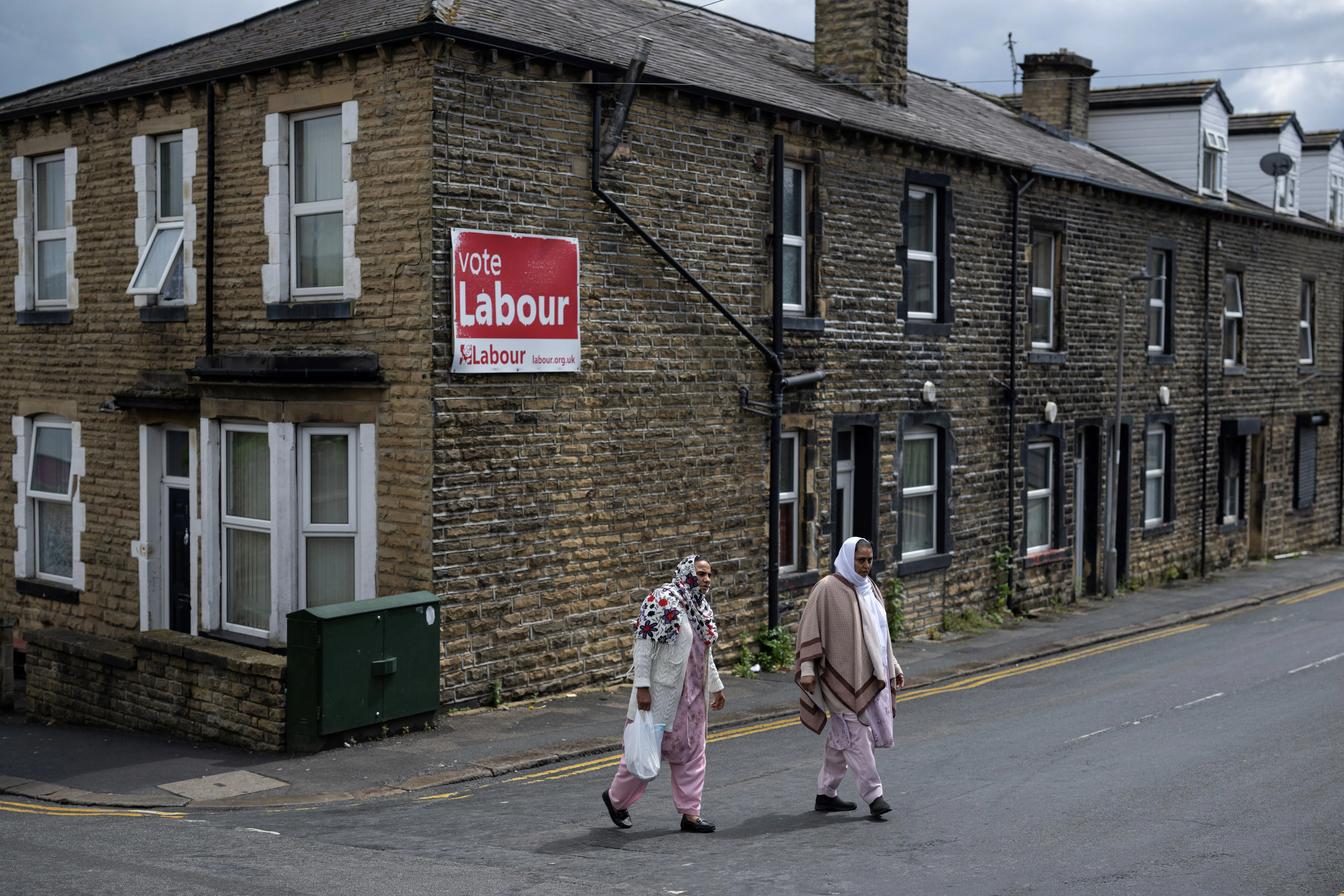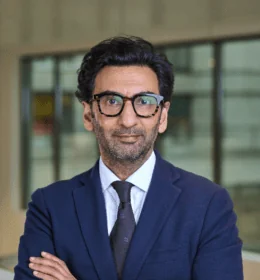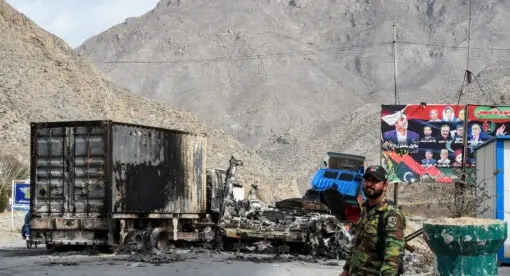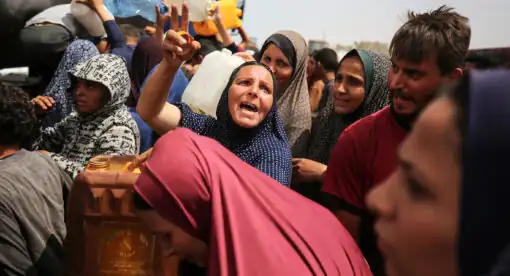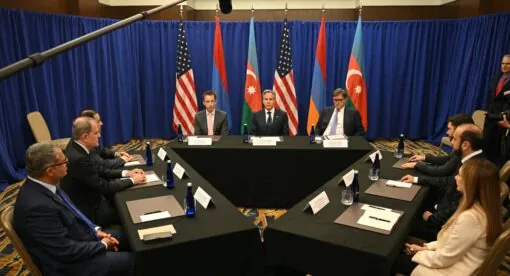Editor’s Note: The New Lines Institute is publishing this on behalf of a new initiative, the Ibn Khaldun Center.
The 2024 elections in France and the United Kingdom marked a watershed moment in the political engagement of Muslim communities and the ramifications of Islamophobia on electoral dynamics. These pivotal events illuminated the intricate interplay between religious identity, national politics, and international conflicts, particularly the Gaza war. The contrasting approaches to secularism and multiculturalism in France and the U.K. offer a compelling lens through which to examine the evolving dynamics of democracy, representation, and social cohesion in two of Europe’s most influential nations. As Western democracies grapple with shifting demographics, surging populism, and the integration of diverse communities, the experiences of France and the U.K. provide critical insights into the intricacies of contemporary multicultural societies.
The elections in the two countries underscored stark differences in the political experiences of Muslim voters, reflecting the distinct historical, cultural, and legal frameworks of each country. In France, where the principle of laïcité has long shaped the relationship between state and religion, the Muslim population of approximately 5.7 million faced unprecedented challenges. The far-right National Rally, led by Marine Le Pen and Jordan Bardella, secured a significant portion of the vote by advocating policies that explicitly targeted Muslim communities, such as banning hijabs in public spaces and restricting dual nationals’ eligibility for certain professions. The political climate intensified existing tensions regarding the visibility of Islamic practices in public life, forcing many French Muslims to navigate a precarious balance between their religious identity and civic engagement.
The election results revealed a widening schism in French society, with Muslim voters increasingly alienated from mainstream political discourse and perceiving their faith as a political liability. This outcome raises fundamental questions about the long-term viability of France’s strict interpretation of secularism in an increasingly diverse society. It also highlights the potential for further marginalization of religious minorities in the political arena, potentially exacerbating social tensions and undermining the very principles of liberty, equality, and fraternity that form the bedrock of the French Republic.
In contrast, the United Kingdom’s multicultural framework facilitated a markedly different mode of Muslim political participation during the 2024 elections. British Muslims, numbering approximately 3.9 million and constituting 6.5% of the total population, demonstrated remarkable political organization and activism. The emergence of grassroots initiatives such as “The Muslim Vote” and the success of various independent candidates in traditionally safe Labour constituencies signaled a departure from conventional party allegiances. This phenomenon was particularly pronounced in constituencies with significant Muslim populations, where concerns about the Gaza conflict and perceived inadequacies in Labour’s response led to a realignment of political loyalties. The election results highlighted the growing electoral clout of British Muslims and their capacity to influence political decisions on issues of importance to their community. This newfound political assertiveness not only revealed fissures within the Muslim electorate but also prompted questions about the long-term implications for mainstream political parties’ engagement with minority communities.
The profound impact of Islamophobia on electoral politics manifested differently according to each nation’s socio-political context. In France, the National Rally’s campaign strategy explicitly leveraged anti-Muslim sentiment, leading to unprecedented electoral success. Their proposed policies, such as the public hijab ban and restrictions on dual nationals, resonated with a substantial segment of the electorate, forcing mainstream parties to adopt more hardline positions on issues related to Islam and immigration. This rightward shift in the political spectrum effectively marginalized Muslim voters, creating an environment where their concerns were either ignored or actively opposed. The election results pointed to a deeply fractured society, with many French Muslims experiencing heightened alienation from the political process. This outcome not only calls into question the efficacy of France’s interpretation of laïcité in fostering social cohesion but also raises profound concerns about the long-term integration prospects of Muslim communities within the French republican framework. The coming years may see intensified debates about the nature of French identity and the place of religious minorities within it, potentially leading to increased social fragmentation and political instability.
In the U.K., while overt Islamophobia was less prevalent in mainstream political discourse, its influence on the 2024 elections was nonetheless significant. The Conservative Party grappled with accusations of institutional bias, jeopardizing its relationship with Muslim constituents and hampering efforts to broaden its appeal. The Labour Party, long seen as a champion of Muslim communities, faced criticism for its perceived equivocation on issues important to Muslim voters, particularly regarding the Gaza conflict. This disillusionment with established parties fueled the rise of independent candidates and grassroots initiatives aimed at mobilizing Muslim voters. The effectiveness of these initiatives in several key constituencies demonstrated the potential for Muslim voters to act as a decisive bloc, capable of swinging electoral outcomes. This phenomenon may further politicize religious identity and potentially deepen societal divisions.
As both major parties reassess their approaches to engaging Muslim voters, the challenge lies in addressing legitimate concerns without resorting to tokenism or exacerbating broader anxieties about the role of Islam in British society. The aftermath of the 2024 elections represents a critical juncture for British politics, requiring a delicate balance between acknowledging the specific issues facing Muslim communities and promoting a broader, inclusive national discourse on diversity and belonging.
Gaza and Polarization
The Gaza conflict significantly influenced the electoral dynamics of France and the United Kingdom, though its effects varied according to each country’s unique political and social contexts. In France, the conflict exacerbated pre-existing tensions related to national identity, secularism, and the integration of Muslim communities. Far-right and some mainstream politicians adeptly leveraged security concerns arising from the conflict to promote more stringent immigration policies and increased surveillance of Muslim communities. This rhetoric not only further marginalized French Muslims but also complicated the left’s attempts to formulate a coherent position that balanced criticism of Israeli actions with opposition to antisemitism. The election results revealed a populace deeply polarized on issues of foreign policy and domestic security, with implications extending far beyond immediate electoral consequences. France now faces the challenge of reconciling its commitment to universal republican values with the realities of a diversifying society influenced by global events. The political establishment must navigate this terrain skillfully to prevent further alienation of minority communities while addressing legitimate security concerns.
In the United Kingdom, the Gaza conflict catalyzed a notable shift in voting behaviors, particularly among Muslim constituents. The Labour Party’s perceived insufficient support for Palestinians in Gaza and reluctance to call for an immediate cease-fire resulted in a significant exodus of Muslim voters from their traditional political home. This disillusionment was evident in the remarkable success of independent candidates campaigning on pro-Palestinian platforms in constituencies with significant Muslim populations. The election results not only altered the composition of Parliament but also revealed a potential realignment of political loyalties around issues of foreign policy and human rights.
As the dust settles, British political parties face the formidable task of recalibrating their approaches to Middle East policy and minority engagement. The effectiveness of grassroots initiatives like “The Muslim Vote” demonstrates the growing sophistication of Muslim political organization and the potential for issue-based mobilization to impact electoral outcomes. This phenomenon raises questions about the fragmentation of the electorate along communal lines and the challenges of formulating coherent foreign policies that reconcile diverse domestic constituencies with international obligations. In the years to come, debates about Britain’s global role and the intersection of foreign policy and domestic politics are likely to intensify, potentially reshaping the country’s political landscape for generations.
Layers of Islamophobia
The intricate interplay between local, national, and international dimensions of Islamophobia and Muslim integration came into sharp focus during the 2024 elections in France and the U.K. This complex web of interactions, coupled with widening socioeconomic disparities, portends significant challenges for both nations in the years to come.
In France, local instances of discrimination against Muslims feed into national debates about laïcité and French identity. These debates, in turn, influence foreign policy decisions and diplomatic relations with Muslim-majority countries. Similarly, in the UK, local tensions in areas with significant Muslim populations can shape national discourse on multiculturalism and integration. This discourse then informs Britain’s stance on international issues, such as the Israeli-Palestinian conflict or relations with countries like Pakistan and Bangladesh. The reverse flow is equally potent. International events, such as terrorist attacks or geopolitical conflicts involving Muslim-majority countries, can rapidly inflame local tensions and influence national policymaking. This cyclical relationship creates a feedback loop that can amplify Islamophobic sentiments and policies across all levels of society.
Both France and the U.K. are grappling with increasing socioeconomic disparities, with Muslim communities often bearing the brunt of these inequalities. In France, many Muslims are concentrated in banlieues (suburbs) characterized by high unemployment, poor housing, and limited access to quality education. The U.K. faces similar challenges, with many British Muslims living in areas of high deprivation, particularly in post-industrial towns and inner-city neighborhoods. These inequalities are not merely economic but extend to political representation, media portrayal, and access to justice. The visible disparity between the experiences of Muslim minorities and ethnic majorities creates a fertile ground for resentment, alienation, and potential radicalization on both sides of the societal divide. The 2024 elections have highlighted how these inequalities can be exploited for political gain, with far-right parties in both countries capitalizing on economic anxieties and cultural fears. As these disparities widen, the potential for social unrest and political instability grows, threatening the very fabric of these multicultural democracies.
The interconnected nature of local, national, and global issues, combined with widening inequalities, creates a highly volatile situation in both France and the U.K. This unpredictability is evident in the rapid shifts in public opinion, the rise of new political movements, and the potential for sudden eruptions of social unrest. Several factors contribute to this instability: the 24-hour news cycle and social media echo chambers can rapidly escalate local incidents into national crises, fueling knee-jerk policy responses; international conflicts or terrorist attacks can swiftly alter the domestic political landscape, often to the detriment of Muslim communities; economic downturns or shifts in the job market can exacerbate existing inequalities and heighten social tensions; and the temptation for politicians to exploit these volatile conditions for short-term electoral gain can lead to long-term social fragmentation.
This precariousness makes the need for urgent and comprehensive change absolutely vital. Both France and the U.K. must address the root causes of inequality and discrimination while fostering genuine social cohesion. This requires a multi-pronged approach:
- Implementing curricula that promote understanding of diverse cultures and religions,
- Addressing educational disparities in underserved communities,
- Developing targeted programs to address unemployment and underemployment in Muslim communities,
- Promoting entrepreneurship and skill development,
- Encouraging greater participation of Muslims in mainstream political parties and institutions at all levels of government,
- Promoting more balanced and nuanced portrayals of Muslim communities in mainstream media and challenging stereotypes,
- Fostering dialogue between Muslim communities and other segments of society to build mutual understanding and trust, and
- Collaborating with other nations to address global issues that fuel Islamophobia, such as terrorism and geopolitical conflicts.
The path forward is fraught with challenges, but the alternative – allowing current trends to continue unchecked – poses an existential threat to the social fabric of both nations.
The 2024 elections in France and the United Kingdom have laid bare the evolving relationship between Muslim communities, political institutions, and broader societal dynamics in Western democracies. These electoral events not only transformed the immediate political landscapes of both nations but also set in motion long-term trends that will likely shape policy development, social cohesion, and democratic processes for years to come. The 2024 elections serve as a wake-up call, highlighting the urgent need for a new approach to managing diversity, promoting equality, and fostering genuine social cohesion in an increasingly interconnected world. As France and the U.K. navigate these turbulent waters, their experiences will offer crucial lessons for other multicultural democracies grappling with similar challenges. The success or failure of these nations in addressing these complex issues will have far-reaching implications, not only for their own societies but for the future of diverse, democratic societies worldwide.
The mobilization of Muslim voters as a distinct political entity in both countries raises profound questions about the nature of representation in multicultural societies and the potential for issue-based politics to transform traditional party allegiances. Both France and the U.K. face the daunting task of reconciling competing visions of national identity, social cohesion, and democratic engagement. The emergence of independent candidates and grassroots initiatives aimed at engaging Muslim voters signals a growing political sophistication within these communities, but it also risks further fragmenting the electorate along communal lines.
Political institutions in both countries must navigate this landscape carefully, developing strategies that address the legitimate concerns of Muslim citizens without resorting to tokenism or exacerbating broader societal tensions. The ability of these nations to forge more inclusive and equitable political systems in the wake of the 2024 elections will provide a blueprint for addressing the complexities of governance in an increasingly diverse and interconnected world. The way forward will require innovative approaches to political engagement, a recommitment to inclusive democratic values, and a willingness to confront difficult questions about national identity and social cohesion in the 21st century.
Tahir Abbas is Professor of Radicalization Studies at Leiden University’s Institute of Security and Global Affairs in The Hague. He graduated with a Ph.D. in Ethnic Relations from the University of Warwick in 2001. His current research interests include Islamophobia and radicalization, gender and violence, and polarization and extremism. He is the author, editor, and co-editor of 20 books, as well as the author, editor, and co-editor of more than 100 peer-reviewed articles and chapters.
The views expressed in this article are those of the author and not an official policy or position of the New Lines Institute.

